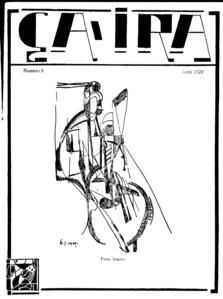 This particular reflection seems obvious to me when I read:
This particular reflection seems obvious to me when I read:
The only thing that interested me fot a moment about the Russians was the Revolution, but it only lasted a faw weeks and now they have the same “bourgeois family” way of thinking as we do here. The Revolution destroyed Tsarist inanities only to replace them with other absurdities which seem to us to have the same opportunist exaggerations as those conceived by the autocratic capitalism of the imperial government.
Moral and physical happiness (extract)
Francis Picabia, July 2nd 1921, 10 a.m.
Why didn’t they see it at the time! With Ça Ira! I find a review that still corresponds with myself in the field of the arts and through politics, and I have great pleasure in noting what Willy Koninckx could publish in 1920 in the Number 1:
The epithets: romantic, impressionist, futurist, cubist, simplist, etc. are laughable; there is no romanticism, there is no impressionism, there is a man. There are not a few men, there are millions of men and every one of these men has a heart, a life.
Does this still have to be repeated, especially as these collective labels, these so-called groups are a camouflage for reality?
Of course, after fifty years of experience loaded with horror, certain aspects of Ça Ira! seem naive, and yet the questions are put, and well put, even in the article by Nico Bunt: ‘The Lightening Horizon’:
Yet, I remember rightly, bourgeoisie, too, has had its revolution: countless heads chopped off during the Terror prove this (which does not mean, however, that the Revolution was not an admirable achievement). But this Tiers Etat, that used to be oppressed, has today become the oppressor: it remembers 1792 and fears the ‘sovereign people’ will mete out the same treatment as was formerly inflicted on the ‘ aristocrats’.
And for the author’s conclusions, after half a century they seem the result of a feeling of protest rather than of constructed thought.
And yet, I can’t help laughing – with no great merit – with hindsight at sentences such as the ones I read in 1973 about the book Poets against the War, when Wily Koninckx says:
They (Flanders and Wallonie) have just escaped from the frightful trap laid for them by world imperialism...
or else
The dead live. They fell, glorious in their sacrifice.
It was frightful, of course. The ‘glorious’ only helped the blacklegs.
This review of which we can give only a glimpse, always contains sentences and lines that now seem aggressive to us in their strenght bound up in the soil:
I hear there in the offices
The cold-skinned old men
Multiply and grow
For the armies of the future.
Couldn’t I have understood that as the inspiration of Michel Debré – cold-skinned! – asking for a hundred million Frenchmen! Come, come, don’t be nasty, now! In fact these lines come from René Arcos in his poem ‘1916’ – another of his poems published in Ça Ira! was ‘banned by the Censor in 1917’. It was called ‘January 22, 1917, Message from President Wilson’.
Ça Ira! had no scruples in publishing, hardly two years after a great massacre for which only the politicians, whatever their party, were to blame, ‘A Kid’s Dream’, also by Willy Koninckx, from which I quote an extract characteristic of the whole:
The final result of the battle was sad. The manufacturers of coffins did not stop production and the schoolmasters, pedantic and finical, declaimed to their pupils the glorious sacrifices and the heroic deaths of obscure soliders.
Burning with questions of the moment, this review piles up clichés, much the same as those used by Georges Pompidou making an election speech to the French people. I quote what Georges Marlier wrote about France:
The most widespread of these ready-made formulae is the one that affirms dogmatically that France is the country of ‘the well-lined stocking’ and that ‘property is much divided there’.
An exasperating review for anyone who hides his ‘lust for power’ behind a cloak of conventional morality. Ça Ira! states and denounces, spreads its registers, as Paul Neuhuys says in 1973 for the complete republication of the review:
Ça Ira! had no other claim than to let some air into our house, to cross frontiers, to know the world.
And the review can do it, in its choices and its articles, its research.
Henri CHOPIN
Collection OU, 7, Ingatestone, Essex, 1977.



